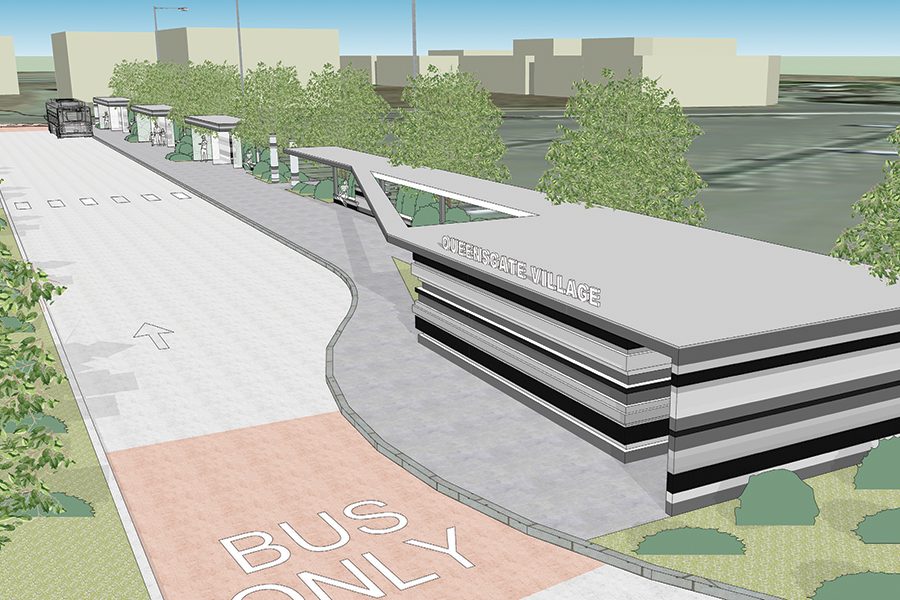
Home » Transit hub to anchor development near Queensgate wine village
Transit hub to anchor development near Queensgate wine village

April 12, 2022
Ben Franklin Transit is embedding a transit hub into the heart of a future development in one of the most prominent retail corridors in south Richland.
The transit agency will build its hub on a strip of land bordering the Southwest Richland Park & Ride, off Columbia Park Trail near the Queensgate Drive roundabout.
Its neighbors include the J. Bookwalter, Tagaris and Barnard Griffin wineries.
The transit agency is buying the property from developer Randy Crosby. Crosby began preparing the site for the $3.1 million project in March, a developer-led arrangement that saves on the final cost of development.

Keith Hall, Ben Franklin’s director of planning and service development, said the transit hub will be nestled into the larger development Crosby envisions for the site, which is accessed by Windmill Road and Tulip Lane.
The property is well known for its high-profile location next to the Interstate 182 interchange, to winery visitors and to area residents who brought their recycling to a station at the end of Windmill.
The city moved the recycling station to Truman Avenue, near the Benton County Emergency Management office north of Target.
Crosby, a Tri-City homebuilder, bought the former Russell vineyard in 2017, several years after it stopped producing grapes when the prior owners went out of business. The vineyard and related buildings are still on site.
He couldn’t be reached to discuss his current timeframe. But in 2018, his team outlined its plans.
Queensgate Plaza, as it was called at the time, would be among the region’s first privately funded mixed-use developments. The ports of Pasco and Kennewick are developing mixed-use projects, at Osprey Point and Vista Field, respectively, but both involve public agencies supported by taxpayers.
The Queensgate Plaza vision included a hotel with a possible water park, retail shops, condominiums and a “park-like” setting with walking paths and bike trails.
It is considered a welcome addition by at least one winery owner, John Bookwalter, who at the time said he was eager to see Tulip Lane improved to better handle the number of visitors coming to the wineries and related businesses, including restaurants.
As a transit center, the location near the Queensgate-Interstate 182 interchange is ideal.
It will serve as an anchor for bus routes serving the western side of the transit district as well as commuters headed to north Richland.
It will become the western hub for Ben Franklin’s Connect program, which offers on-demand rideshare services to make it easier for riders to access the bus network. Connect serves riders who are too far from bus stops to use the system.
The transit hub will have two bays for dropping off riders, three for picking them up and two for layovers as drivers take breaks or wait for the start of their next runs. Charging stations will serve its future electric-powered bus fleet.
Plans include a secured area for bicycle parking. Hall said there is potential to lease space to a commercial bike shop. The hub will use shelters and landscaping to protect users from the heavy winds that rake the area.
A small building will house restroom facilities for drivers – but not the public – as well as other equipment, including charging equipment.
The hub will be accessed from a new one-way driveway on Columbia Park Trail, with buses leaving via Windmill Road-Tulip Lane, near the J. Bookwalter Winery.
The new driveway, which will traverse a deep ditch via bridge, will serve the future mixed-use development as well.
Hall said the transit agency is waiting for final permits from the city of Richland before it solicits construction bids. The Washington Department of Transportation is paying about 80% of the cost.
The project doesn’t have a formal name but is referred to as the Queensgate Transit Station.
It will take about 14 months to build after bids are opened and a contract is approved by the Ben Franklin Transit board.
The transit hub is one of several initiatives to facilitate connections to the regionwide transit system and to bring its facilities up to the standards of the Americans with Disabilities Act.
On April 14, the transit agency board, comprised of representatives from area city councils and county commissions, will vote on awarding a two-year,
$1.3 million contract to ESF Development LLC to update 40 bus stop pads and add 30 shelters, garbage cans and other amenities each year.
In many cases, bus stops are inaccessible because there is a curb and grass or gravel barrier between the bus and the nearest sidewalk.
A recent update to a stop on Sandifur Parkway near Grocery Outlet in Pasco created a concrete pad that bridges the strip between road and sidewalk, making it easier for people who use wheelchairs and others to get on and off buses.
The project is locally funded, but the agency is seeking federal grant funding to expand its vision.
At the same April 14 meeting, the board will vote on a request to temporarily reduce its 0.6% sales tax rate to 0.5% and to submit a proposal to voters to make the change permanent. Advocates say taxpayers need the money more than the agency, which reported $66.6 million in cash and investments on March 31, 2022.
Nearly $24 million is allocated to capital projects over the coming year and an additional $20 million is budget for “future periods.”
Ben Franklin funds capital projects on a pay-as-you-go basis and does not bond or borrow money.
Sales taxes provide the lion’s share of the transit agency’s funding – an estimated $49.4 million in 2022. If the reduction is approved, it will trim $8.3 million in sales tax funds and an additional $3.4 million in support grants, the agency said.
At 0.6%, Ben Franklin is on par with its peers both large and small. Spokane Transit collects 0.8% while Pierce Transit, Valley Transit, Whatcom Transit, Clallam Transit and Mason Transit all collect about 0.6%.
The agency said it will adapt by reducing service, reducing capital expenditures, or a blend of both.
Go to bft.org/about/agendas-minutes for information and a Zoom link.
Real Estate & Construction Local News
KEYWORDS april 2022





